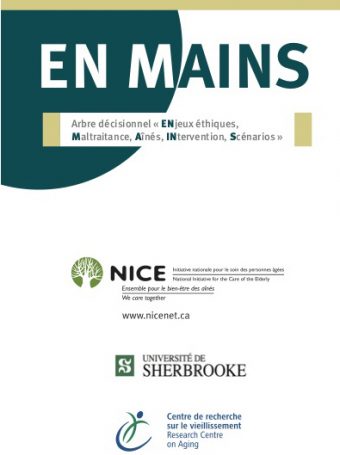PRESENTATION
The In-Hand Practice Guide was designed to enhance ethical reflections of health and social service practitioners in their decision-making during the intervention process in situations of the mistreatment of older adults. This decision-making framework proposes three intervention scenarios:
1) Suspension of follow-up
2) Support
3) Interventions that ensure more protection
In each scenario, the guide presents the values at play, introduces various suggestions for practice, and underlines the psychosocial and ethical issues raised by the practice.
ORIGIN AND DEVELOPMENT
The In-Hand Practice Guide was developed in the first decade of the 2000s, in the following social context in Québec:
- The growing number of older adults aging at home, some with the support of relatives and services
- The absence of legislation to protect older adults in Québec (Bill adopted in 2017: L-6.3.)
- A lack of clear policies on intervention in situations of mistreatment. (In 2010 and again in 2017, the Government of Québec adopted an Action Plan to Counter the Mistreatment of Older Adults)
- No standard intervention model shared by various organisations
- Few regions have round-tables that deal with the mistreatment and negligence of older adults in all its forms. (Creation of Regional Coordinator positions with the government’s 1st Action Plan).
DEVELOPMENT
To better understand and improve intervention practices, a review of the literature concerning ethical and psychosocial issues of intervention practices was conducted from 2000 to 2004.
This first step spotlighted the five principle themes in addressing these issues:
- Reflecting on our preconceived notions and values
- Consideration of the older adult’s aptitude
- Preservation of confidentiality and information sharing
- Links between intervenors and organisations
- The source of responsibility: social problems or family issues
- The search for balance between everyone’s values.
At the same time, accounts of existing practices were collected through interviews of psychosocial intervenors with experience in situations of mistreatment of older adults.
In 2004-2005, thanks to a grant from the CRI-VIFF, an initial version of In-Hand was developed in the form of a decisional chart. A training program followed in 2006-2007.
In collaboration with community organisations, the second version of In-Hand was produced (2006-2007), as well as a revised training program (2007-2009). During this same period, a validation of the tool (2007-2009) was conducted.
In 2009-2010, the third version of In-Hand became the final practice guide. Thanks to a grant from the National Initiative for the Care of the Elderly (NICE), the guide is now available in English (Canada) and reproduced in booklet form in both French and English (2009-2010).
In conclusion, the currently available training program is the third to have been developed to accompany the In-Hand Practice Guide.
ACCESS TO THE GUIDE
Half or full-day training sessions given by the Chair are recommended for optimal use of the In-Hand Practice Guide. Please contact the Chair by e-mail or call 819-780-2022 Extension 45621 for more information.
References (in French and English) for the In-Hand Practice Guide :
-
- Beaulieu, M. (2010). En Mains. Arbre décisionnel « ENjeux éthiques, Maltraitance, Aînés, INtervention, Scénarios ». Initiative nationale pour le soin des aînés. Toronto. 20 p.
- Beaulieu, M. (2010). In-Hand. An Ethical Decision-Making Framework. National Initiative for the Care of the Elderly. Toronto. 20 p.
